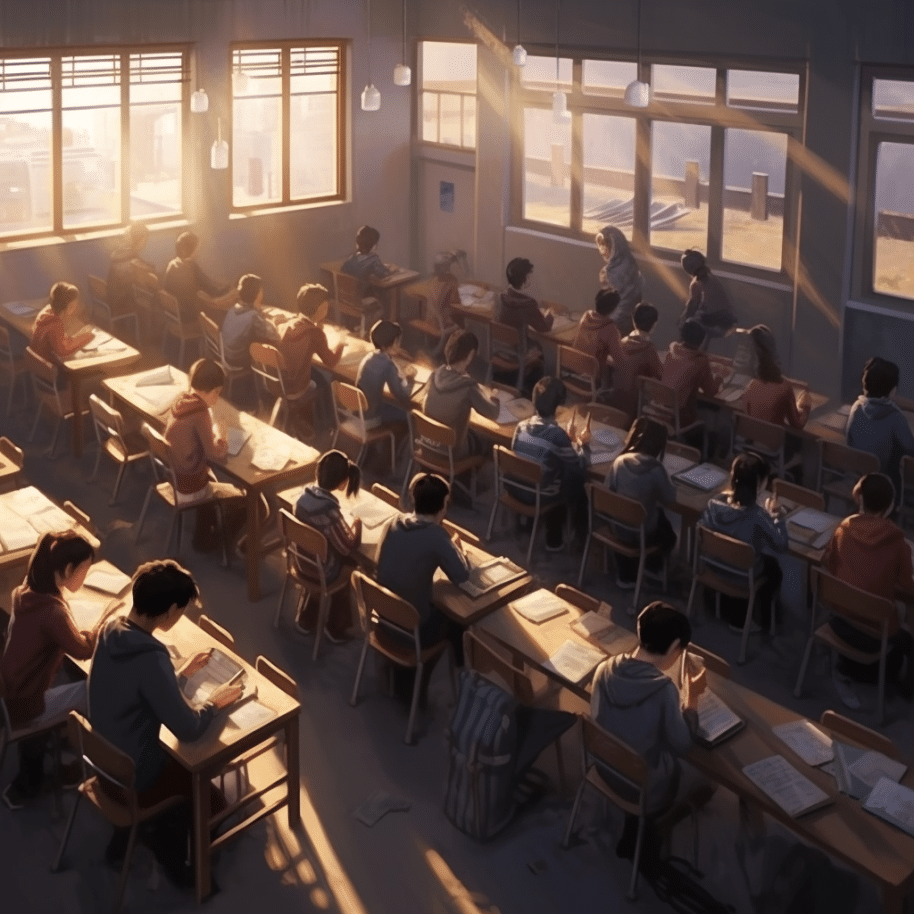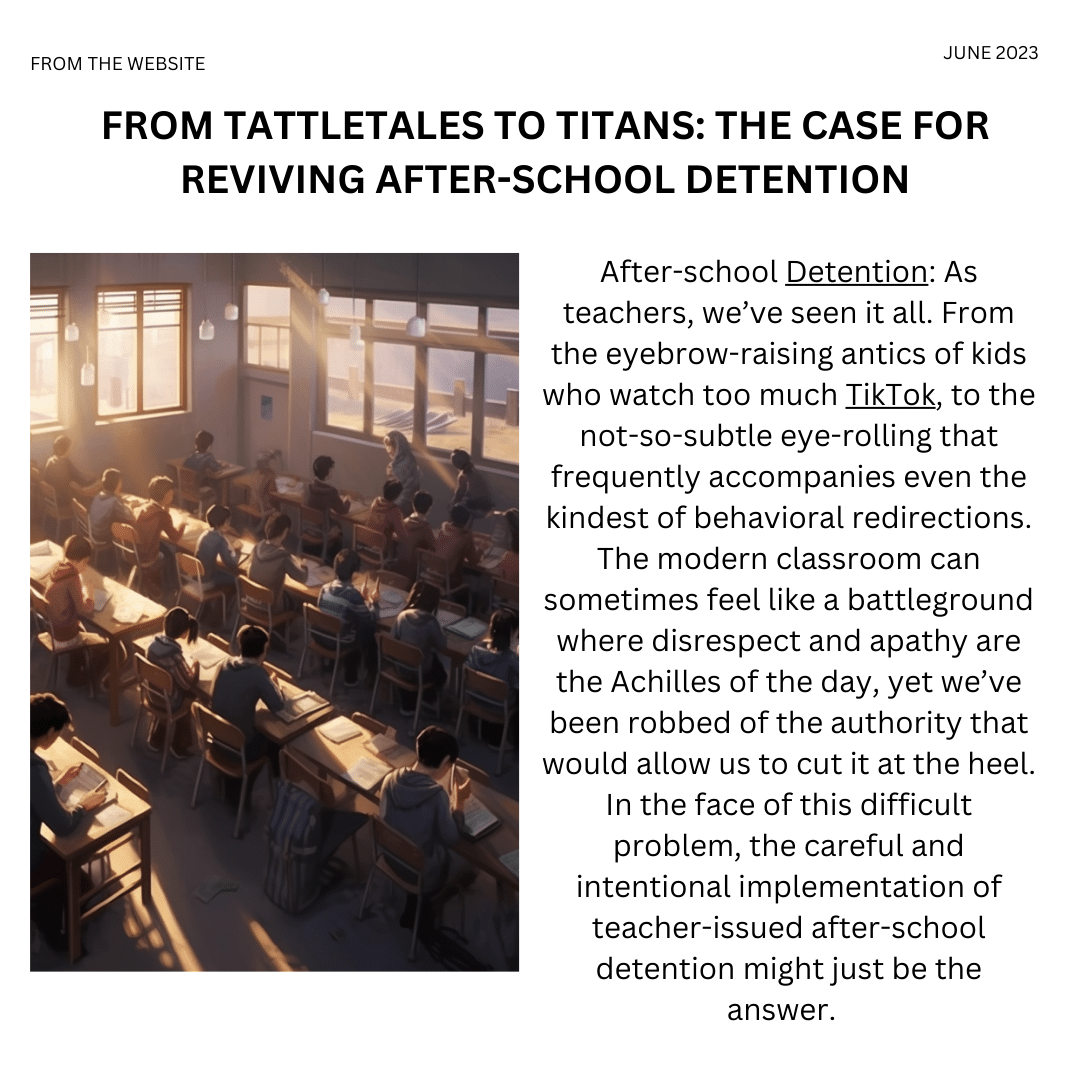Is After-School Detention the cure for some classroom management issues?
As teachers, we’ve seen it all. From the eyebrow-raising antics of kids who watch too much TikTok, to the not-so-subtle eye-rolling that frequently accompanies even the kindest of behavioral redirections. The modern classroom can sometimes feel like a battleground where disrespect and apathy are the Achilles of the day, yet we’ve been robbed of the authority that would allow us to cut it at the heel. In the face of this difficult problem, the careful and intentional implementation of teacher-issued after-school detention might just be the answer.
Teachers or Tattletales?
Thinking about the current state of classroom management in many school systems begs the question: why would our students respect the authority we bring to the classroom when we have essentially been relegated to head tattletale? Our consequential power for poor behavior typically takes shape in a discipline form or parent contact, which means that we are always relying on another figure to impart repercussions. Sure, we can ask students to head to the office for extreme behaviors or step outside to cool down, but there isn’t any way to immediately address the mild disrespect that compounds over a class period with a consequence that truly makes a difference.
There is a growing disconnect between the authority of teachers and the respect commanded by students. The lack of immediate and meaningful consequences allows for the normalization of disrespectful behavior, leading to an erosion of classroom structure and a decline in the educational experience for both teachers and students alike.
How Effective Are the Current Consequences?
The current system of consequences is practically a reward for the disrespectful or apathetic student. Out-of-school suspension? That’s basically the child equivalent of PTO for a student if they don’t care about their grades or have active parents. In-school suspension? Often a sanctioned opportunity for students to miss class and socialize with their naughty comrades.
The Solution
It’s time we considered bringing back the tried and true method of after-school detention. You know, the one where students have to sit silently, contemplating the error of their ways while the clock ticks by at an agonizingly slow pace. There’s something poetic about a student being forced to stay behind after everyone else has left, and the consequence enforces a clear message: If you waste the time of your teachers and your peers, we’ll waste yours, too!
Moreover, after-school detention provides the perfect opportunity for teachers to reclaim their authority. No longer will we be reduced to mere tattletales, begging for backup from parents and administrators. Instead, we can now wield the mighty and immediate power of the detention slip.
Motivating Parents to be Stakeholders
One of the most significant benefits of after-school detention is the parental involvement factor. Let’s face it, parents would be far more proactive about their child’s behavior if poor behavior would inconvenience them by having to come to pick their child up. Surely a few days after that, even the most lackadaisical parent would begin to enforce consequences at home. This increased level of parental engagement not only helps to reinforce school-based consequences but also serves to inspire more parental involvement at home.
Not Necessarily Negative
Detention doesn’t have to be all doom and gloom, either. In fact, it might just be the perfect opportunity to explore the social and emotional lessons that we so rarely have time to impart in general instruction. If implemented in this way, detention wouldn’t just be a reactive consequence–It would also be an opportunity to take a proactive approach to stop future undesirable behavior. Consider incorporating reflection exercises, conflict resolution strategies, or even academic interventions into the detention period. This approach not only addresses the student’s behavior but also provides them with the necessary tools and support to navigate future situations more effectively.
Tailoring Detention to the Individual
Another aspect to consider is the customization of after-school detention to address the specific needs and circumstances of the individual student. By tailoring the experience, we can create a more impactful and meaningful consequence that addresses the root cause of the issue, rather than simply doling out a one-size-fits-all punishment.
For instance, a student who struggles with time management and organization may benefit from a structured study period during detention, while a student who has issues with anger management may be guided through relaxation techniques and self-reflection exercises. This individualized approach not only allows for a more targeted intervention but also sends a message to the student that their educators genuinely care about their growth and well-being.
Consequences
While PBIS systems and a focus on restorative justice absolutely have a place in the classroom, the current system of consequences for poor behavior is failing teachers and students alike. The lack of immediate and meaningful repercussions allows for the normalization of disrespectful behavior, leading to an erosion of classroom structure and a decline in the educational experience. However, after-school detention may provide a solution to this issue.
Detention can be an opportunity for teachers to reclaim their authority and for students to reflect on their behavior, receive academic support, and learn conflict resolution and social-emotional skills. Moreover, it has the potential to increase parental involvement, and detention can be tailored to the specific needs of the individual student. By implementing after-school detention in this way, we can address the root cause of the issue and support students’ growth and well-being while also maintaining a structured and respectful classroom environment.

Caroline Abney is a secondary teacher with three years of experience and five distinct teaching fields under her belt. Using her own interest in the genetic mysteries of Biology, the alien frontiers of Earth and Space Science, and the inspiring minds of great authors of World Literature, Caroline’s foremost passion is helping students develop an innate desire to understand the world around them. She is a South Mississippi native who recognizes the distinct challenges her students face and focused on creating equity driven classrooms during her time as a teacher. Caroline is currently taking a step back from the classroom in order to seek a second degree in Computer Science with the ultimate goal of developing educational technology that has a broader impact on the educational field.







